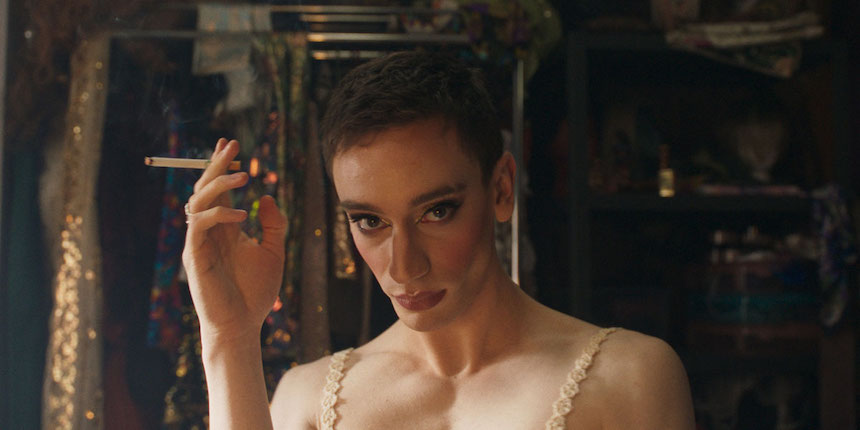Toronto 2023 Review: SOLO, Love That Elevates, Love That Binds

How can we know what makes us happy? More importantly, how can we trust the people around us to make us happy, support us in our happiness, provide us with the love and care we deserve? And how can we know when what we're receiving is not love, but manipulation? It can be hard to see in a haze of newfound love, or love that has sat untended but abiding despite its neglect.
For her third feature, Québécois filmmaker Sophie Dupuis (Underground, Family First), joined by rising star Théodore Pellerin, create a vibrant, intimate, and heartbreaking story of a young man whose happiness is slowly eroded by jealousy, control, and lack of understanding, not only from one source, but also from himself.
Simon (Pellerin) is a make-up artist by day; but by night, he is Glory Gore, a rising star in the Montréal drag queen scene. At the club, surrounded by friends and mentors, he finds his home - with that confidence and vivacious joy that comes from being loved and supported. His act is full of beauty and talent, and it's no wonder Olivier (Félix Maritaud), another performer from France, is swept up in that joy. They both are; but that initial rush of love and sex is soon to disappear. Simon's famous opera singer mother Claire (Anne Marie Cadieux) has returned to Québec to perform after a long absense. As her elusive presence weighs on Simon, Olivier begins to slowly pick away at Simon's beautiful world.
While Simon might have a supportive family, especially with his sister Maude (Alice Moreault), the world is still largely unkind (to put it mildly) to the queer community, particularly to those who perform drag. But it is an artistic expression, a performance - how much is 'genuine' is a question the same for any other performing artist, but for Simon, he thrives. The spotlight naturally falls on him. And at first, he and Olivier seem made for each other: they blend their work to perform duets, and seem to fall quickly in love. But it's not long before Olivier has a one-night stand and makes 'casual' disparaging remarks about Simon's choice of wardrobe: the manipulation begins slow but insidious.
While Maude refuses to see their mother, Simon wants nothing more. But while performing might have come naturally to her, motherhood did not, and she only spends what time with Simon as she can slot between rehearsals and fancy dinner. This is the first crack in Simon's life - as a young man prone to optimism, it's hard to reconcile the woman from whom he thinks he has inherited so much, to the one that barely gives him the time of day.
Dupuis paces this out perfectly, as we watch Simon go from confident to insecure, joyous to gloomy. We can recognize right away the signs of Olivier's jealousy and controlling nature in how he's slowly making Simon dependent on him, alternating praise with criticism; what's more disheartening is to see how quickly Simon's friends seem to turn on him. One lie is enough to make Simon's status fall with his peers. As Simon finds his mother evading any semblence of dependency from her son, so Simon desperately clings to Olivier; some part of him knows that he doesn't deserve to be treated this way, but he can't help himself: to have a person like Olivier look at him not just with admiration at his talent, but with wonder at his being, is too irresistable, despite the treatment.
As Simon, Pellerin is mesmerizing. You can't help but instantly fall in love with this character, and want to protect him. It's tempting to want to jump through the screen to stop those who are doing him harm. Pellerin shows every subtle shift of emotion as Simon's descent into pain speeds up, and his anger is an understandable fury. Dupuis's cast shows how it is in the seemingly small gestures and words that abuse finds its mark.
And working with director of photography Mathieu Laverdière, the drag scenes are wonderous to behold, even as they are, in moments, painful in reflection of the character's emotional states. We see the time and care that Simon and the others have put into their make-up, their costumes, their choreography, how the songs chosen are a statement of their persona.
Solo is a story of love: the kind that should make us stronger and better, and the kind that slowly eats away at our souls. In part also a love letter to drag queens and their art form, Dupuis has crafted a beautiful, engaging, honest, and ultimately joyous story of how we can fall prey to this whose love is toxic, and find again a better love within ourselves and our chosen community.







